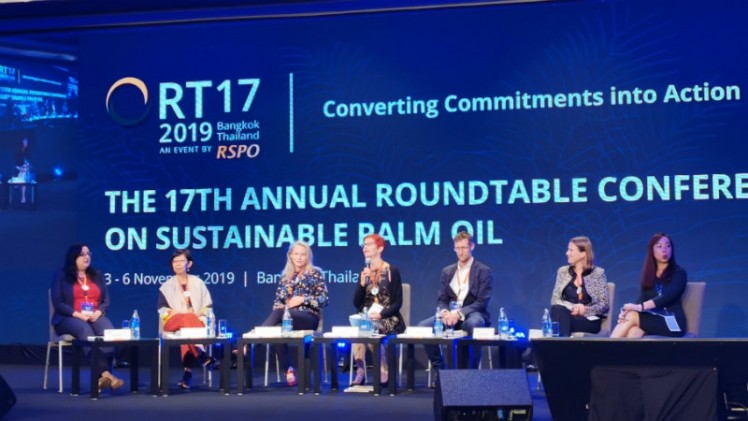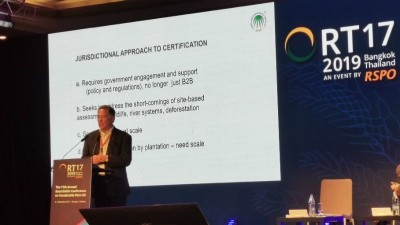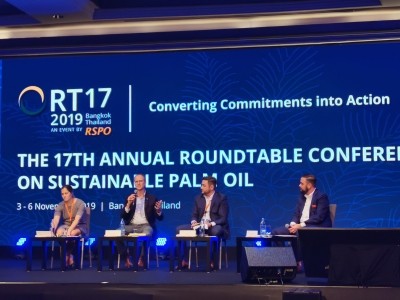RSPO RT17
Credibility, collaboration and action: Expert panel on why RSPO pilot is a vital sustainability push

The eventual goal of implementing these new Shared Responsibility requirements is to increase demand and uptake of RSPO-certified sustainable palm oil (CSPO), putting equal responsibility on all members from oil palm growers to Consumer Goods Manufacturers (CGMs) such as packaged food firms.
As such, the panel comprised of representatives from several main stakeholder categories. All panelists were direct participants in the RSPO Shared Responsibility Task Force which produced its final Shared Responsibility Requirements and Implementation document, the final version of which was recently published on November 5.
They were: PepsiCo Sustainable Commodities representative Natasha Schwarzbach (representing manufacturers), Bumitama Group Head of Corporate Social Responsibility Lim Sian Choo (for growers), Forest Peoples Programme Director James Whitehead and Proforest Programme Director for International Programmes Bilge Daldeniz (for NGOs), ABN Amra Bank NV Head of Sustainability Ghislaine Nadaud and RSPO Impacts and Evaluations Director Oi Soo Chin.
The session took place during the recent RSPO RT17 event in Bangkok, and was chaired by LiSeed Consulting’s Aimee Russillo.
The panel discussed several major reasons for the Shared Responsibility pilot and requirements as a whole, and FoodNavigator-Asia has identified three key takeaways from the discussion:
Real action
A major theme behind this was to ‘translate commitments into action’, with the hope that these requirements will result in an enabling environment that will help to pull up the demand for CSPO across major markets including food and beverage.
“This will enable the RSPO Shared Responsibility secretariat to generate uptake and match supply with demand,” said Oi.
This was most clearly demonstrated via the announcement of a new, ambitious target for downstream players such as F&B manufacturers in increasing CSPO uptake alongside the pilot announcement.
“We are committing to close the huge gap of RSPO-certified volumes (of palm oil) on the market of 1.6 million tonnes,” said Schwarzbach.
“This year, 2019, will be Year 1, and will be considered the baseline [for further target increments of CSPO uptake] moving forward.”
Although no direct mention was made of the proposal to increase mandatory CSPO purchases by 15% annually during the panel, the final document confirms that this proposal has gone through, at least for the pilot period.
“The demand balance for CGM was [around] 20% to 40%, and for Retailers [this was] around 15% to 25%. [The task force] agreed to targets for CGM and retailers at 15% for Year 1,” it stated.
The annex section of the document listed ‘Active promotion [to] boost demand in all markets, including aggressive targets to increase uptake percentage annually [by 15% with Year 1 volume as baseline’ as a requirement for CGMs, with the increase for subsequent years to be decided based on annual RSPO projection models.
Schwarzbach emphasised that because this was still a pilot, no penalties are in place yet for failing to meet volume uptake.
“Over the next 12 months, incentives and sanctions will be developed, and until these are fully in place, working out strategies and initiatives towards this goal [should be the way forward for now],” she said.
Credibility
Based on this, the issue of trust and credibility was also highlighted as an important element in making the whole concept work, especially when it comes to dealing with consumers.
“Credibility is a very important element of all this. Downstream consumer confidence is directly predicated on credibility and trust [in the product and/or brand],” said Whitehead.
“In sustainability, the credibility of audits is also very crucial to prove that CSPO is being used. Shared Responsibility requirements look to strengthen overall credibility, an audits are a part of that so it will also be looked at.”
Collaboration
Although collaboration is not a new term in the world of palm oil sustainability, this approach essentially formalises this and makes it ever more necessary for members across different stakeholder categories to work together.
“Under these requirements, all RSPO members share the same responsibility although they [are likely to] play different roles,” said Oi.
“For the RSPO Shared Responsibility secretariat, this pilot in Year One is all about innovating and learning, enhancing existing tools to support these new requirements, further developing some areas like incentives and resourcing, as well as to gather and analyse the relevant data.”
According to Whitehead, NGOs are likely to also play the key role of providing some much-needed realism to the entire situation.
“For example, there is a role for both environmental and social NGOs to play to point out when things go wrong, and highlight the gap between rhetoric and reality,” he said.
All in all, with this formalised, it will be crucial for all players to figure out new ways to work together for the better.
“It is an opportunity to explore a different type of collaboration,” added Nadaud.


















